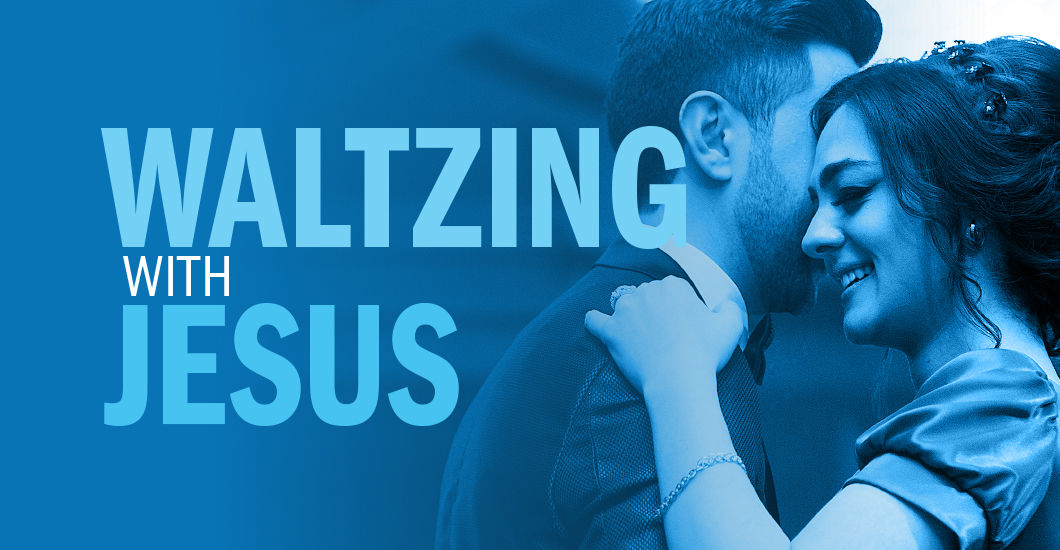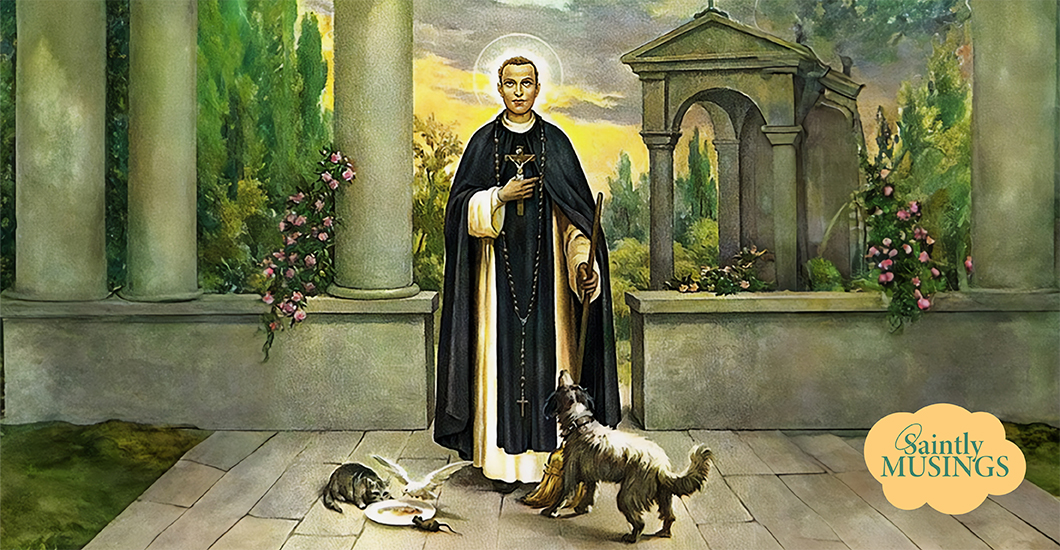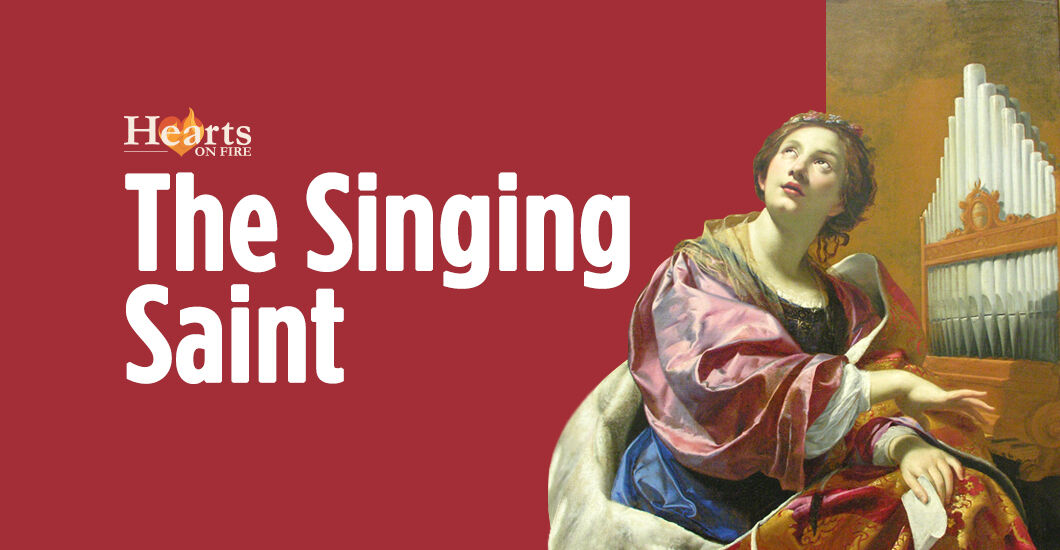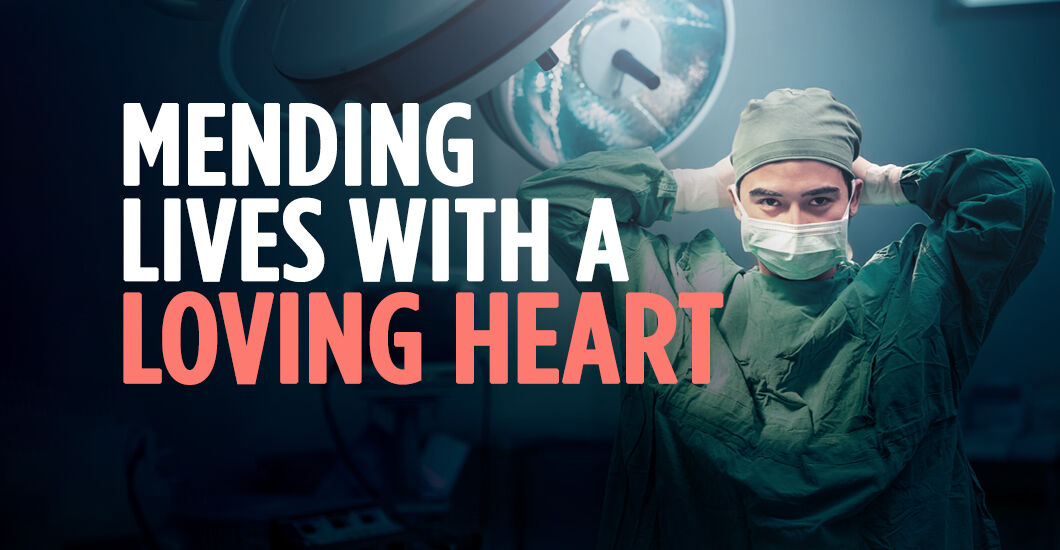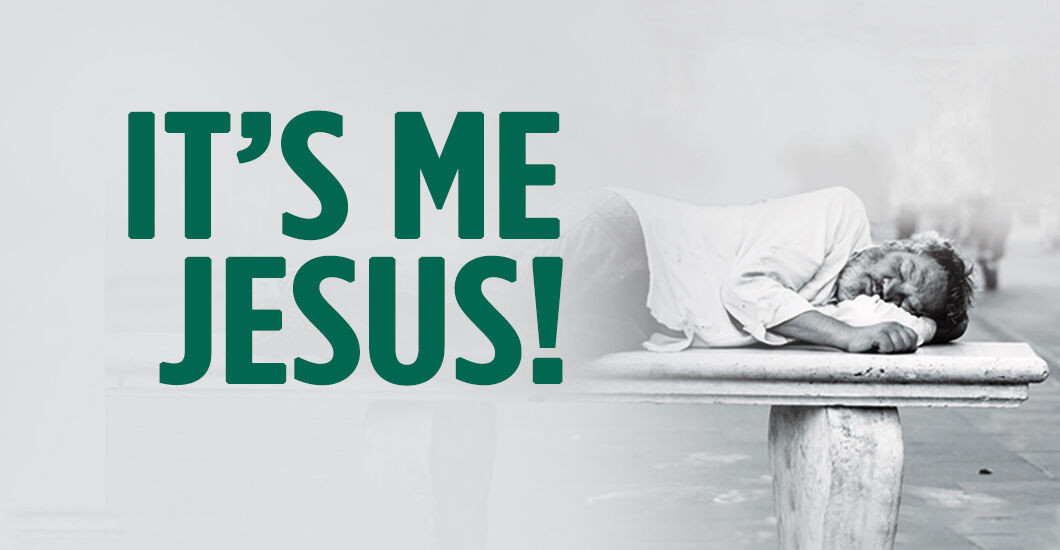Trending Articles
Waltzing With Jesus
During the offertory time of the Holy Mass, I sometimes close my eyes rather than sing the beautiful hymn. One Sunday, I had my eyes closed while I listened to the Offertory hymn. The song reminded me of the melody of a graceful slow waltz.
In my mind’s eye, I pictured Jesus walking toward me, looking into my eyes and bending in front of me to take my hand and gently kiss it. Then, He invited me to dance with Him. I saw myself not as an adult but as a child with a flowing white dress and dainty white shoes. I placed my tiny feet on His large feet and so the waltz began. He swirled me around and around with incredible grace. As the waltz finished, I pictured Jesus leading me back to my pew and kissing my hand. As He did so I distinctly heard him whisper, “Prepare your heart to receive Me.” The tears softly flowed down my checks as I felt His love penetrating and transforming me.
I love to watch couples dance. I am not a dancer as I have two left feet. Despite my best efforts, if I attempt a waltz I end up tripping and stomping all over my unfortunate partner’s feet. I am so clumsy.
I kept pondering the image of Jesus dancing with me. Even though I try to be a good Catholic, I often end up tripping and stubbing my toes—and other people’s toes—along the way.
However, Jesus takes my feeble attempts at the practice of my faith and transforms them with His grace. He turns my journey of faith into a heavenly waltz. My prayer is that I always remember to take Jesus’ hand and enter into His dance of love.
I also contemplated the words I heard Jesus say to me, “Prepare your heart to receive Me.” How do you prepare to receive Jesus in the eucharist? I try to read the scripture readings before Mass and reflect upon them. I like to arrive a little early for Mass to pray the rosary since Our Blessed Mother helps to prepare my heart to receive her son, Jesus. As the priest raises the host and says, “Behold, the Lamb of God …” I whisper, “Jesus, Son of the living God, have mercy on me, a sinner. I come to receive You, sinful and sorrowful. I beg Your mercy upon me.”
Let us face it, none of us could ever adequately prepare our hearts to receive the body, blood, soul and divinity of our Lord Jesus Christ. However, Jesus takes our feeble preparation and showers us with His merciful love. “The steadfast love of the Lord never ceases; His mercies never come to an end; they are new every morning; great is Your faithfulness” (Lamentations 3:22-23).
Jesus, You are all that I need.
Jesus, You are all that I want.
Jesus, You are worthy of all my praise.
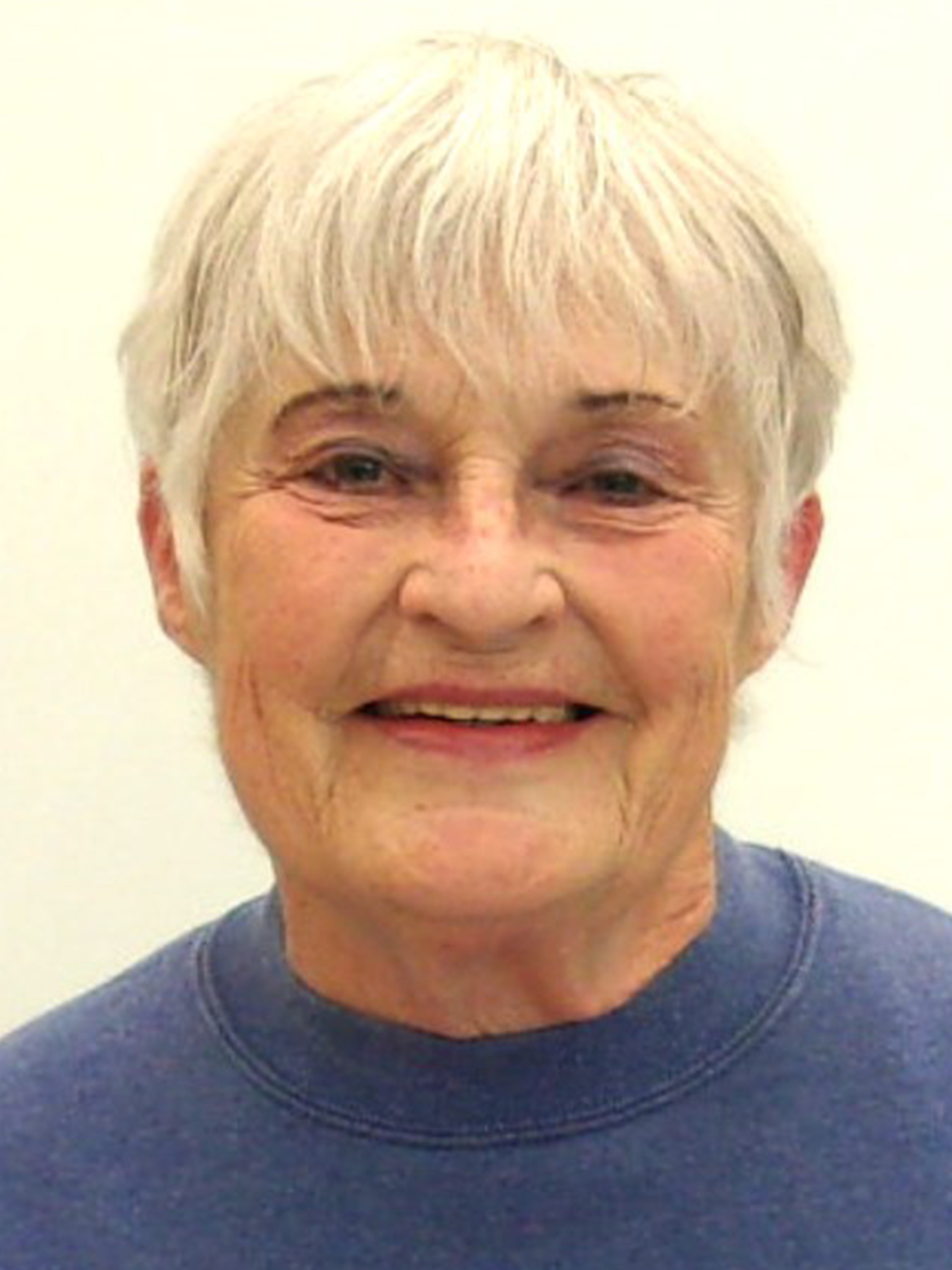
Connie Beckman is a member of the Catholic Writers Guild, who shares her love of God through her writings, and encourages spiritual growth by sharing her Catholic faith
Related Articles
Something made me stand still that day…and everything changed. I was about to start my rosary group at the nursing home where I work as a pastoral care practitioner when I noticed 93-year-old Norman sitting in the chapel alone, looking forlorn. His Parkinson's tremors seemed quite pronounced. I joined him and asked how he was doing. With a defeated shrug of his shoulders, he muttered something in Italian and became quite tearful. I knew that he was not in a good place. The body language was very familiar to me. I had seen it in my dad a few months before he died—the frustration, sadness, loneliness, angst of ‘why do I have to continue living like this,’ physical pain evident from the furrowed head and glassy eyes… I became emotional and could not speak for a few moments. In silence, I put my hand on his shoulders, assuring him that I was there with him. A Whole New World It was morning tea time. I knew that by the time he manages to shuffle to the dining room, he would miss the tea service. So, I offered to make him a cuppa. In my minimal Italian, I was able to discern his preferences. At the nearby staff kitchen, I made him a cup of tea, with milk and sugar. I cautioned him that it was quite hot. He smiled, indicating that’s how he liked it. I stirred the drink many times as I did not want him to get scalded, and when we both felt it was the right temperature, I offered it to him. Because of his Parkinson’s, he could not hold the cup steady. I assured him that I would hold the cup; with mine and his trembling hand, he sipped the tea, smiling so delightfully as if it was the best drink he ever had in his lifetime. He finished every single drop! His shaking soon stopped, and he sat up, more alert. With his distinguished smile, he exclaimed: “Gracias!” He even joined the other residents who soon ambled to the chapel, and he stayed on for the Rosary. It was only a cup of tea, yet it meant the whole world to him—not only to quench a physical thirst but also an emotional hunger! Reminiscent While helping him drink his cuppa, I remembered my dad. The times he enjoyed the meals we had together without rushing, sitting with him at his favorite spot on the sofa as he struggled with his cancer pains, joining him in his bed listening to his favorite music, watching healing Masses together online… What drew me to meet Norman at his need that morning? Surely it was not my weak and carnal nature. My plan was to set up the chapel quickly as I was running late. I had a task to accomplish. What made me stand still? It was Jesus, who enthroned His grace and mercy in my heart to respond to the needs of someone. At that moment, I realized the profoundness of Saint Paul’s teaching: “It is no longer I who live, but it is Christ who lives in me.” (Galatians 2:20) I wonder when I reach Norman’s age and I long for a cappuccino, ‘with almond milk, half strength, extra hot,’ will someone make one for me with such mercy and grace too?
By: Dina Mananquil Delfino
MoreWhatever the situation you are going through, God will make a way where there seems to be no way… Today, my son Aaric brought home his dictation book. He got a red star with a ‘good’ remark. This might not be a big deal for a kindergartener, but for us, it is a celebrated achievement. The first week of school, I got a call from his class teacher. We dreaded this call, my husband and I. As I tried hard to explain his communication skills (or lack thereof) to his teacher, I remember confessing that while I cared for his big sister with special needs, I had fallen into this pattern of doing things without being asked. As she could not utter a single word, I had to guess her needs. The same mode was turned on for Aaric, too, in his early days. Even before he asked for water, I would give it to him. We had a bond that didn’t need words, a language of love, or so I thought. How miserably wrong I was! Not much later, when his little brother Abram turned three months old, I had to take those heavy steps again to see the counselor at school. This time, it was about Aaric’s poor writing skills. His dear class teacher panicked when she saw him drop his pencil on the table and stubbornly fold his hands as if to say: “I won’t write.” We dreaded this, too. His little sister Aksha was an expert at scribbling at the age of two, but Aaric wouldn’t even hold the pencil. He just didn’t fancy it. The First Step After receiving instructions from the counselor, I visited the principal, who insisted that we undergo a thorough assessment if his communication continues to be weak. I couldn’t even think of that back then. For us, he was a miracle baby. After what we went through with our firstborn and three miscarriages, Aaric had defied all odds. He was born full-term, unlike what the doctors had predicted. His vitals were normal at birth. “He’s a big baby!” exclaimed the doctor on bringing him out through a C-section. We watched him grow step by step with almost bated breath, praying nothing would go wrong. Aaric soon reached all his milestones. However, when he was just one year old, my father mentioned that he may need speech therapy. I brushed it off as being too early to diagnose. The truth was, I didn’t have the strength to face another problem. We were already worn out with all that our firstborn was going through. Anna was born preterm at 27 weeks. After many grueling days in the NICU, she was diagnosed with severe brain damage at three months and had epileptic seizures. After all the treatments and medications, our now 9-year-old daughter still battles with cerebral palsy and intellectual disability. She is unable to sit up, walk, or talk. Countless Blessings There’s a limit to holding off the inevitable, so six months ago, we reluctantly took Aaric to get an initial assessment. The ADHD diagnosis was hard. We struggled to accept it, but we still put him through speech therapy. At this point, he was only stuttering a few words. A few days back, I mustered the courage to go to the hospital with Aaric and get a full, thorough assessment. Mild autism was what they said. As we were going through the process of assessment, several questions were asked. To my surprise, my response to most of these questions was: “He wasn’t able to, but now he can.” Praise God! By the power of the Holy Spirit living in him, everything is possible. I believe that praying and blessing him every day before going to school has made a difference. The change was radical when he began to memorize Bible verses. And the beauty is that he recites those verses just when I need them. Indeed, the Word of God is living and active. I believe the transformation is ongoing. Whenever I feel low, God surprises me by making him say a new word. Amid the tantrums he puts up, and when everything seems to crumble down, my little girl, three-year-old Aksha, simply comes up and gives me a hug and a kiss. She really knows how to comfort her mama. I believe that God will surely intervene and heal our eldest daughter, Anna, too, for nothing is impossible for Him. Change is already visible—the number of times she goes into epileptic seizures has gone down tremendously. In our walk of life, things may not be going as expected, but God never leaves nor forsakes us. Just like oxygen that is essential yet invisible, God is ever present and provides the life we need so badly. Let us cling to Him and not doubt whilst in the darkness. May our testimony reveal the truth of how beautiful, wonderful, and loving our God is and how He transforms us to say: “I was …, but now I am ….”
By: Reshma Thomas
MoreMartin de Porres was born in 16th-century Peru; he grew up facing the stigmas of both his mixed race and illegitimacy. After a barber-medical apprenticeship in his young years, he joined the Dominicans as a ‘lay helper’ and continued his barber work in the monastery. One day, Brother Francis Velasco Carabantes approached Martin, desiring to talk to this man whom people were already starting to believe was saintly. Martin was busy with his barber work; he absent-mindedly grabbed this novice and placed him in the barber’s chair. Brother Francis had no inclination to have his head shaved; he disliked the hairstyle that the Dominicans used. Before he could resist, Martin had finished his job, and Brother Francis was angry beyond expression. He started to shout, calling Martin all sorts of curse words. Martin was lost in prayer, and by the time he noticed that this novice was shouting, one of the rectors had seen the commotion and was scolding Brother Francis, who was severely punished and sent away. Martin, once he came to realize what had happened, went to the rector with all possible excuses. He begged forgiveness for this person who had verbally abused him, trying even to explain away the curse words used. Finally, he told the rector: “Everyone knows what a sinner I am.” The rector, who was aware of Martin’s saintly life, gave in to his request and forgave Brother Francis. Not satisfied with this, Brother Martin even sent fresh fruit, which was a rare delicacy in the monastery, to Brother Francis. How many times have we rejoiced in the ‘just’ punishments that our transgressors received? Let us pray to Saint Martin for the virtue of humility, to forgive and show the other cheek, as Jesus taught us to do.
By: Shalom Tidings
MoreHow often do we muse over not getting enough time to do the things we like? This New Year, let’s make a difference. I have never really been one to make New Year’s resolutions. I am reminded of this as I look at the stack of unread books gathering dust on my desk, purchased in the previous years in an ambitious yet miserably failed attempt. A book a month turned into a stack of unread intentions. I had a million reasons as to why I wasn’t successful in my resolution, but lack of time wasn’t one of them. Looking back now on the years lost with a slight disappointment in myself, I realize I really could have made better use of my time. How often in my life have I complained about not having enough time to do the things I’d like? Certainly more than I can count! A few years ago, sitting next to my husband in the hospital on New Year’s Eve as he received his routine treatment, something tugged at my heart. Observing him uncomfortably connected to his intravenous infusion, I noticed that his eyes were closed and his hands were folded in prayer. Apparently feeling my quizzical stare, he slightly opened one eye and, while peeking at me, quietly whispered: “Everyone.” Somehow, he read my mind. We often pray for those around us whom we perceive as hurting or in need of prayers, but today, we were sitting alone, and I was puzzled as to who he may have been praying for. It was moving and inspiring to think that he was praying for “everyone” and not just those who we assume could use prayers because of their outward appearances. Everyone—every one of us needs prayers. We are all in need of God’s grace and mercy regardless of the image we project to the world. This seems true, especially now when so many people are silently suffering from loneliness, financial trouble, and even mental health struggles that are often hidden away. No one truly knows what another person is going through, has gone through, or will go through. How powerful would it be if we all prayed for each other? How life-changing, world-changing, it could be. So this New Year, I am resolving to use my spare time more wisely and thoughtfully—prayerfully considering the sufferings and needs of others, those others that I know, those that I don’t know, those who have come before me, and those who will come long after. I am going to pray for all of humanity, trusting that our dear God, in His abundant mercy and immeasurable love, will bless us all.
By: Mary Therese Emmons
MoreGod sends no one away empty-handed—except those who are full of themselves I once heard a Taekwondo master tactfully correct a young teenage boy who was looking to be his martial arts student: “If you would like to learn martial arts from me,” he said, “you need to pour out the tea in your cup first, and then bring back the empty cup.” To me the master’s meaning was clear and concise: He didn’t want a prideful student. A cup full of tea has no space for more; no matter how good what you try to add is, it will overflow the cup. Likewise, no student can learn from even the best of masters if he is already full of himself. As my eyes followed the young man walking away in indignation, I told myself that I would never fall into that prideful trap. Yet a few years later, I found myself bringing a cup brimming with bitter tea to God—my Master. Full to the Brim I was assigned to teach religion to PreK to second grade students at a small Catholic school in Texas. I received that assignment from my religious superior with bitterness and discouragement. For me, the reason was quite understandable: I had completed my Master of Theology degree, because I wanted to become a college professor in Sacred Scripture, and later, a sought-after public speaker. This assignment clearly did not meet my expectations and required so much less of me than what I thought I could give. In tears I fell prostrate onto the convent’s chapel floor and lay there for a long time. How can I bring myself to teach a bunch of little children? How can I benefit from working among kids? Indeed, my teacup was full to the brim. But even in my pride, I could not bear to walk away from my Master. The only way out was to beg Him for help. The Master saw me through and through and was ready to help me drain my teacup so he could fill it with more tasteful tea. Ironically, he chose to use the very children put in my charge to teach me humility and empty my cup of pride. To my surprise, I began to realize that the children were budding, little theologians. Regularly, their questions and remarks gave me greater understanding and insights into the nature of God. A question from four-year-old Andrew brought a surprising result: “How can God be inside of me?” he asked. While I was organizing my thoughts and preparing a sophisticated theological answer, little Lucy replied without a moment’s hesitation, “God is like air. He is everywhere.” Then she took a deep breath to show how like air God could be inside her. Trained by True Master God not only used the children to help me empty my cup, but also to teach me ‘martial arts’ for my spiritual battles. While watching a short video about the story of the Pharisee and the tax collector, little Matthew broke down in tears. When I asked, he humbly admitted, “I bragged the other day that I had shared my ice cream with my friend.” His words reminded me to remain on guard against the sin of pride. By the end of the year, I had learned that as I emptied my teacup, God was filling it with Himself instead. Even the children told me so. One day, Austin sneakily asked, “Sister, what is the Bible?” Not waiting for an answer, he pointed at me: “You are the Bible,” he said. I was a bit shocked and confused but little Nicole supplied the explanation, “Because you are all about God,” she said. It was through the children that God poured new tea into my cup. Many of us go to God asking Him to teach us how to fight our spiritual battles without realizing our cup is too full of pride to have room for His teaching. I have learned that it is easier to bring an empty cup and ask our master to fill it with His own life and wisdom. Let’s allow the true master to train us and give us exercises for our life journey and for the battles we will inevitably fight. He may surprise us and use little children, or others we think little of, to teach us, but let us remember that “God chose the lowly and despised of the world, those who count for nothing, to reduce to nothing those who are something, so that no human being might boast before God” (1 Corinthians 1:28-29).
By: Sister Theresa Joseph Nguyen, O.P.
MoreThe Christian writer Tertullian wrote that “the blood of the martyrs is the seed of the Church.” A sterling example of that truth is the third century martyr, Cecilia. Her name is recited daily in the canon of the Mass, and she remains to this day as one of the great Saints of the early Christian era. Hers is an inspiring yet bloody story. Despite having vowed her chastity to Jesus, her wealthy parents arranged a marriage with a young suitor named Valerian. You can imagine the young man’s surprise when, on her wedding night, Cecilia informed him that she had not only taken a vow of chastity but that her virginity was under the watchful protection of her guardian angel. Amazingly, her husband agreed to respect her vow and even promised to embrace Christianity, but he had a condition: he wanted to see her guardian angel. Her counter-request was that he travel to the third milestone on the Appian Way and there receive baptism at the hands of Pope Urbanus. After emerging from the waters of baptism and returning home, Valerian did indeed see the angel sitting beside Cecilia. Eventually, her husband’s brother Tiberius was also converted,and the brothers regularly buried Christians who were murdered almost daily by the local Roman prefect. Eventually they were arrested and imprisoned for refusing to offer sacrifices to the gods, but they managed to convert their jailer before losing their lives in martyrdom. Not long after, Cecilia herself was arrested and condemned to death. She miraculously survived a night amidst intense fire meant to suffocate her. Then an executioner struck three separate blows to her neck in a failed attempt to decapitate her. Left bleeding, Cecilia survived three days, preaching all the while to those who gathered round her and who collected the blood that flowed from her wounds. Her relics, and those of her husband, brother-in-law, and the converted jailor, are kept in Rome’s Church of St. Cecilia. Her body was found incorrupt when it was exhumed in 1599 and because on her wedding day she sang hymns to Jesus in her heart, Cecilia is the patron saint of musicians. We celebrate her feast on November 22.
By: Shalom Tidings
MoreAs the weeks rolled by with my husband working from home, putting us together 24 hours a day, I found myself once again feeling like a volcano about to erupt...Little did I know then how quarantine would change my life… It was the spring of 2020 and Covid-19 had spread throughout the country and much of the world. It was a time when quarantine changed my life. We were adapting to new phrases like “social distancing,” and “sheltering in place.” And connecting to others was limited to the use of technology. Thus, a friend of mine encouraged me and some other friends to join her for an online Bible study, pandemic-style. After watching sections of a video and reading portions of the book that accompanied it, we’d text our thoughts and comments to one another. In the first chapter of the study I came across the word “forbearance.” Despite having been a student of Scripture for years, I realized this term was not a part of my lexicon! It was not unfamiliar to me, as I’d come across it throughout the Bible, but the word forbearance seemed better suited to another time in history. The author described this virtue as the ability to hold back one’s power, even if one has the authority to use it, for the greater good that may not be evident to the one seeking relief. She offered a metaphor to explain: imagine God having two arms, both powerful. While stretching out His right arm to exert power, He at times uses his left arm to pull the other hand back, so as to prevent its strength being wielded. I shared this insight on the group text. One participant responded that “He cares enough to allow me to struggle and find deeper understanding and connection to His heart.” I’d seen this very thing in my life over and over through the years. The 40 years I’d worked in healthcare seemed to parallel the 40 years the Israelites wandered in the desert. Grumbling and complaining marked each of our respective journeys yet the Lord continued to provide for my needs and those of the Israelites and taught us obedience which resulted in patience, one of the “fruits of the Spirit.” Over time, patience has become a habit and I rarely express irritation or anger verbally anymore—at least outside the doors of my home! While I had made progress even within my home, I still found it to be the place that triggered my darker angels. Although I was blessed with a good and loving husband, his switch to working from home due to quarantine required an unexpected adjustment to being together 24 hours a day. As the weeks together wore on, I found myself once again feeling like a volcano about to erupt. I tried to suppress it, but when for what seemed like the hundredth time Dan knocked a full glass of tea, ice cubes and all, onto the end table, I exploded and ran to grab towel. When I later apologized, I remembered what my husband told a representative from the Big Sisters organization who had called for a spousal referral to determine my suitability as a volunteer. In response to my curiosity about the content of their lengthy conversation he replied, “I said lots of nice things about you. They did ask me if I thought you were a patient person. I told them you are very patient...with everyone but me!” As we chuckled together, both recognizing the truth in his statement, I realized that in the area of patience, God isn’t finished with me yet. Since retiring, I had adopted a routine of walking in the neighborhood each morning. The exercise kept my thoughts focused as I poured out my heart to the Lord each day. I confessed my impatience, asked forgiveness, listed my husband’s good qualities, and thanked God for him. What I couldn’t seem to do was exercise forbearance! I obviously wasn’t exhibiting the dictionary’s definition of “patient self-control, restraint and tolerance!” One morning, after another frustrating day of my husband working from home, I laid it all out as I prayed. “Lord, I have tried every way I know how to pray about this. I surrender to Your work in my life; make me a truly patient person with everyone, even my husband. I’ve done what I can; now I ask You to do in me what I cannot do in myself.” As the day ended, I happened to glance at the stack of devotionals on the end table. One of the books maybe sixth or seventh from the top caught my eye. I hadn’t opened it in some time, and didn’t even remember what it was titled. Still, I was drawn to it. It was called, “Biblical Homilies,” by Karl Rahner, a noted German theologian. I opened the volume to where a bookmark lay and laughed at the title on the page: “If You Can Put Up With Him, So Can I.” Fr. Rahner cited 1 Peter 3: 8-9: “Finally, all of you be of one mind, sympathetic, loving toward one another, compassionate, humble. Do not return evil for evil, or insult for insult; but, on the contrary, a blessing, because to this you were called, that you might inherit a blessing.” I read the sermon that followed: “This harmony and concord, then, is interpreted to mean that we must be united in prayer. No doubt the letter of St. Peter refers to a general disposition to get on with people.” This idea is obvious enough. We know only too well what a trial we are to each other.” (I paused...how did Fr. Rahner know what was going on in my house?!) “We are so different from one another: we have had different experiences, we are of different temperaments, of different origins, we come from different families, we have different talents and different jobs to do—small wonder if it is difficult for us all to be of one mind. We have different views and we understand each other imperfectly. And being so very different from other people we well may grate on them, unconsciously weary them with what we are, what we think, what we do, what we feel. Mutual harmony and comprehension, being of one mind, is difficult for us. Now we can only live together and bear with each other, bear one another’s burdens, if we do our best to be of one mind, if we are self-effacing and self-possessed, if we can hold our tongue even when we are right,” (now I was sure this priest had been peering at me through the window these last weeks!) “if we can let the other man be himself and give him his due, if we refrain from rash judgment and are patient.” (There was that word again!) “Then it becomes possible, at least in a rough and ready way, to be of one mind. We may not achieve empathy together, but we can be of one mind in Christian forbearance,” (FORBEARANCE!!! The word I never examined or considered until a week or so ago!) “each bearing the other’s burden. This means that I bear the burden the other man is to me simply by being himself, because I know I am a burden to him simply by being myself.” I already knew I couldn’t change anyone but myself, and that didn't seem to be going so well either! Seeing it spelled out so clearly, as given, brought the pieces together. Dan always worked hard to show me he loved me, despite my frailty. He lived the law of love for me. I looked online to find references to “forbearance” in scripture. Turns out, there were different translations of the word, based on the culture and time when each was compiled—Long-suffering, patience that endures, great-heartedness, even “developing a willingness to stick with things”. My response toward Dan felt like “long-suffering,” while his toward me looked much more like “great-heartedness.” We had found very different ways to incarnate the same virtue. I remembered the definition of forbearance I’d heard in the bible-study video: the ability to hold back one’s power, even if one has the authority to use it, for the greater good that may not be evident to the one seeking relief. It was the same lesson I’d learned through years of practicing physical therapy—calm responses made greater difference over time. Without taking time to comprehend what was driving a patient’s resistance to treatment, there would be no progress. Once they knew I understood them, my patients’ transformation would begin. Their progress was well worth my extra effort. I saw now that God was asking me to hold back my power--whether my tongue or my thoughts--for the greater good of our marriage. I had been “seeking relief;” but couldn’t see how it would come. With this realization, quarantine changed my life—by bearing the burden of the one to whom I had promised to be true, in good times and in bad, to love and honor all the days of my life, just as he did for me. How would I practice forbearance? Glancing at a picture of my husband, I knew: the example was right before my eyes.
By: Karen Eberts
MoreWith over 40 years of experience he had accomplished great feats; but interestingly he found true joy elsewhere When I was 11 years old, a bad leg injury from a motor vehicle accident led me to choose my career. After multiple reconstructive procedures I began to say, "When I grow up I'm going to be a plastic surgeon.” I feel blessed that I was able to fulfill my dream of mending lives. When I tell people that I’m a plastic surgeon many are curious about my cosmetic surgeries, but they rarely ask about the reconstructive procedures I perform. The chief difference between the two kinds of surgeries is that most cosmetic surgery is a “want" while reconstructive surgery is a “need". Surgeries in the “need” category are procedures for maxillofacial trauma, skin cancer, burn care, skin grafts and flaps, complex wounds, hand surgery and others. However, in third world countries like Mexico and the Dominican Republic, many patients desperately need and want reconstructive surgery. Sadly, either because they don’t have money or because there is no reconstructive surgeon available, their needs go unmet. To help such patients, I went on medical missions to both countries to volunteer my services with a loving heart. I dealt with two cases there that I would probably never have encountered here in the United States. The first was a woman so poor that she had never owned a pair of shoes. Therefore, the big black mole on the top of her foot was easy pickings (and peckings!) for her chickens. It typically bled, often became infected and always hurt. She begged me, “Por favor Doctor, quiteme este lunar” (Please Doctor, remove this mole). In less than 30 minutes her problem was resolved. A simple but real medical need. She was so appreciative that she hugged me and thanked me profusely. The second patient was a 16-year-old boy with a very wide cleft lip that left his prominent front teeth always exposed. He told me there was a girl in school he really liked but he was too ashamed and embarrassed to ask her to be his girlfriend. In about 2 1/2 hours I was able to change his life. When he was coming out of anesthesia, he looked in a mirror and saw a huge smile with no teeth showing. At his follow up visit, I had to ask, “Que dijo la muchacha?” (” What did the girl say?”) He responded with an emphatic, "Dijo que Si!!!" (“She said yes!”) Like the other seventy or so patients on whom I have operated, these two patients were extremely appreciative. But I also found true joy of my own by mending lives with a loving heart—seeing their smiles, their tears of joy and receiving those warm hugs. My experience frequently reminds me of what Jesus says to His disciples in Matthew 20:28, “the Son of Man came not to be served but to serve". I thank the Lord for blessing me with skills to mending the lives of those most in need.
By: Dr. Victor M. Nava
MoreFear can paralyze us. Fear about family matters. Fear about health. Fear about career. Fear about the future. Many of us carry around such fears. One day I felt so full of fears that I could feel them weighing me down. My jaws felt tight, my throat felt dry, and I could feel my entire body tense up. I felt helpless, as if the challenges that lay ahead of me were an enormous mountain blocking my way forward. “LORD, HELP ME!” I shouted from the depths of my heart. In my distress, I sobbed out all my fears to the Lord. In answer the word, “Remember” resonated through me. I hunted around for a pen and paper to write down the words pouring out of me, one after another: Remember the miraculous way the Lord God Almighty granted you your first job. Remember the time you called out to the Lord for help, and He responded immediately. Remember the beauty of His creation that surrounds you everywhere. The floodgates opened up. Every memory etched gratitude to the Lord deeper into my heart for His never-ending faithfulness and goodness. And I continued to write. Remember how the Lord answered your prayers and granted you virtuous friendships. Remember how He brought the right people into your life when you needed them most. Remember. Remember. Remember the faithfulness of the Lord, Sherin! The more I wrote, the more I recalled His faithfulness and presence in my life. After writing three pages worth of these memories, I paused and reread all that I had written. I realized how quickly I had forgotten His steadfast love for me when I was faced with new challenges. Filled with deep gratitude, I wanted to hold onto these memories of His faithfulness. So, I grabbed my cell phone and took photos of the pages I had filled and I set it as the home screen on my phone. Every time I picked up my phone throughout the day, I was reminded yet again of His faithfulness. Doing so brought a sense of peace and reassurance that no problem is too big for my Lord and my God. This greater trust in the Lord induced a state of calmness and stillness as I went about my daily tasks. The Voice Message Two or three days later, I unexpectedly received a voice message from a good friend who had no idea of my recent prayer experience. He mentioned an old Christmas card that I had written to him six years ago and pointed out a single line I had written in that card. “The Lord Remembers. Daniel 14: 38”. The Lord remembers? What is my friend talking about? I was clueless. I went straight to the source—my Bible, quickly flipping through the pages to Daniel 14:38. “And Daniel said, ‘You have remembered me, O God; and have not forsaken those who love you.” Daniel 14:38 The timing and content of my friend’s message left me speechless. In the depths of my heart, I felt as if the Lord had responded to me through my friend’s voice message. The message was clear. My Lord remembers me too, just as I try my best to remember Him and His faithfulness.
By: Sherin Iype
MoreIt was a cold and snowy afternoon several years ago, when I felt like going to Adoration. My own parish didn’t have Perpetual Adoration yet, so I drove to a parish that did. It has a small, very intimate chapel where I loved spending time with Jesus, pouring my heart out to Him. My hour was almost over when I heard two people talking in the back of the chapel. I was disconcerted and distracted by their insensitivity regarding a homeless man in the narthex, so I decided to leave. My hour was almost over anyway. As I left, I passed through the narthex where the man was sleeping so soundly that he didn’t even stir when I paused to say a prayer over him. I felt relieved that the doors were unlocked for Adoration so he could find shelter. He appeared to be homeless, but I didn’t know for sure. What I do know is that I was moved to tears by my concern for this man. I could hardly contain myself as I wandered outside where a statue of the Sacred Heart reminded me of Christ’s loving concern for every person and His abundant mercy. I begged the Lord to tell me what to do. In my heart, I felt the Lord telling me to go to the nearby store and pick up a few necessities for this man. I thanked Him and immediately bought a few things that I thought the man might be able to use. All the way back to the chapel, I hoped the man would still be there. I really wanted to give him what I had purchased. When I arrived, he was still sleeping. I quietly set the bags down near him, said a prayer, and began walking away. I had almost reached the exit when I heard someone call, “Lady, lady”. I turned around and replied, “Yes”. The man was now awake and approached me, asking if I had left the bags for him. I replied, “Yes, I did.” He thanked me saying how thoughtful that was. No one had ever done that before. I smiled and said, “You’re welcome”. The man was coming closer and I felt as if I was in the presence of Jesus. I felt so much love in my heart. Then he said, “Lady, I will see you in Heaven.” I thought I would burst out crying. His voice was so kind and loving. I was compelled to give him a kiss on the cheek. We said goodbye to each other and went our separate ways. Outside, I couldn’t stop crying. I cried all the way home. Even now, I am moved to tears when I remember that afternoon. That cold, snowy afternoon, I realized that I had indeed met Jesus in that beautiful man. Now, when I look back, I imagine Jesus saying to me, “It’s Me, Jesus!” with a big smile on His face. Thank you, Jesus, for reminding me that I can meet you in each person I encounter.
By: Carol Osburn
MoreLatest Articles
Discover how a simple snowflake can inspire you. As I drove to the Church, the snow that was supposed to turn to rain continued to fall. Individual flakes hit my windshield, quickly revealing their uniqueness before melting away. By the time I exited the Church after Mass, the snow lightly blanketed the ground. It was beautiful! Dressed in white, the barren farmland and the trees that had shed their colorful leaves no longer looked so desolate and dead. Despite the cold, the snow spread a sense of hope through the air. Of course, my children were hoping the snow would continue so that they would not have to go to school. In my part of the world, snow does bring school-age children such hope and joy. But the feeling I had that day walking out of the church was different. Standing amid the falling flakes, a verse from Psalm 51 came to mind: “Wash me, and I will be whiter than snow.” Therein lies the hope I felt – the knowledge that God loves me despite my weaknesses and sins. I need only to ask for His forgiveness and supernatural help to overcome them. He wants to cover me with His love and mercy like the snow falling gently on the earth. Thriving in Grace I took solace in the gradual covering. Our Lord is patient with us. He does not dump graces on us but allows us time for transformation. He gently leads us on the path of conversion. As I gingerly walked across the parking lot, I appreciated the baby steps we take on our journey that leads us to become the saints God is calling us to be. He delights in even our smallest progress. By afternoon, that which was a field of overturned dirt was now a woolen blanket. How amazing that those little flakes gathered together make such a difference! Such is the transformative power of grace! At every Mass when we receive Holy Communion, our souls are washed clean in the Blood of the Lamb. With each sacramental confession, we are reconciled to God and to one another. The ‘dirt’ from sin that stains our souls is washed away by the graces bestowed in these two powerful yet gentle Sacraments. Then, God sends us out into the world. Each of us, as unique as a snowflake, has our own gifts and talents. We share the Gospel in our little part of the world. Perhaps we feel like we don’t do enough, or aren’t effective enough. We feel as tiny as that snowflake. But consider how God needs each snowflake to do its little part to cover the land. Together, we can change the world! I do not have to do it all by myself. Neither do you. We just need to land where God places us and be the unique person He created us to be, spread God’s love, and make known all the good He does for us. The world will be a brighter place if we do.
By: Kelly Ann Guest
MoreHow does any parent survive the death of a child? I cannot begin to answer this question as a professional counselor but only as a mother who has lived through the worst nightmare of her life. We were blessed with two boys who were the joy of our lives. The night of the accident, my husband Cliff and I, along with our 15-year-old son Chris, spent an indescribable, terrifying night waiting, hoping, and praying that David, our 17-year-old, would somehow return home safely. The accident occurred around 10:30 pm, but the highway patrol never discovered it until 7 am the next day. When we received the horrible news, our scant flicker of hope crumbled helplessly within our hearts. I cried from the depths of my being. I was emotionally numb. Looking back after all these years, I see how God, in His compassion and love, supplied my body and spirit with an emotional safeguard that temporarily blocked out the enormous shock of this painful, unbearable reality. Thinking of that night reminds me of the touching words of the poem entitled Footprints in the Sand, in which our loving God said: “During your times of trial and suffering when you see only one set of footprints, it was then that I carried you.” God continued to carry our grief-stricken family through the painful funeral, the processing of life insurance claims, and the closing out of David's checking account. Each time I had to do these necessary things, I asked Jesus to give me strength. Tackling Grief After three weeks, I went back to work. I felt as though I was leading a double life during the months that followed. I would drag myself to work each day, drained and consumed with a deep sadness. For months, I felt as though I was an actress playing a part in a real-life drama. I tried to function normally at work, attempting to perform my required duties. At home, behind closed doors, I could then be true to my feelings and sob from the deepest part of a mother's grieving heart. Crying often became my only cleansing release. In this age of fast food, high-speed Internet, and instantly replaceable everything, society has a hard time accepting the fact that deep grief takes time to heal. If a person has a physical injury, he or she is pampered and taken care of until the wound has been completely healed. But it seems if a person has an emotional injury, he or she is expected, in a short while, to show up for work and be as efficient as ever. I finally had to accept the fact that society as a whole didn't consider emotional wounds to take time to heal. I had shared one part of that journey earlier in an article titled Impossible Made Possible*. Healing is not a single-moment-magic. I continued into the next year, processing through my pain and loss. With special dates like Thanksgiving, Christmas, David's birthday, and what would have been his high school graduation, I regressed into a deep sadness, filled with many days of crying. The professionals in the field of grieving state: “The healing process is more like a lightning bolt, full of ups and downs, progressions and regressions, dramatic leaps and depressing backslides.” When my sorrow overwhelmed me, God always sent caring neighbors, understanding friends, and loved ones. They each listened, loved me, and helped me to go on. Into the second year of processing my grief, I became aware of my deep hidden guilt. My guilt stemmed from an acute sense of regret about not being able to say all the many things hidden deep in my heart to my son David while he was alive. I knew, as a mother, I had made many mistakes while raising my son. I felt it was too late to share those precious thoughts and feelings with him. I suffered over this and asked God to forgive me. I felt God had forgiven me, but I couldn't forgive myself. I decided to write my son a letter in which I was able to express my deepest thoughts and feelings to him. After I finished the letter, I felt a sense of cleansing and release. David's physical life is over, but his soul is with Jesus, surrounded by unconditional love. This is indeed the promise that Jesus holds out to each of us. “I am the resurrection and the life. Those who believe in Me, even though they die, will live.” (John 11: 25) I have a renewed sense of hope because I know that I will see my child again at the Heavenly Banquet being prepared by our Father in Heaven. Through experiencing deep anguish and sorrow, I have emerged as a more compassionate person. As I release my son in love, I have received the healing power of God's grace. As my wounds have healed, so do I become an instrument of God's grace in reaching out to others who are grieving… *You can read the article Impossible Made Possible here: shalomtidings.org/impossible-made-possible
By: Connie Beckman
MoreThe Gospel for Easter Sunday is from Saint John’s account of Easter morning (John 20:1–9). We are told that Mary Magdalene arrives at the tomb very early in the morning while it is still dark. She has come to anoint the body of the Lord, which had been buried in haste because of the onset of the Passover. She spies the great stone rolled back and assumes that the body has been stolen. So she runs immediately to Simon Peter and the other disciples: “They have taken the Lord from the tomb, and we don’t know where they put him.” She doesn’t yet believe in the Resurrection, for she is operating still within a conventional framework. So the two disciples, Peter and John, make a mad dash toward the tomb, the younger John outpacing the older Peter. What an odd detail, by the way—so peculiar in fact, that it led the novelist Graham Greene to accept the historicity of the account. Upon coming to the open tomb, John looks in and sees ‘the burial cloths.’ Then Peter arrives and spies the same clothes, as well as the cloth that had covered his head ‘rolled up in a separate place.’ Have you ever wondered why there is such an emphasis on the burial cloths? The most obvious reason is that their presence is peculiar. If the body had been stolen, why would the thieves have bothered taking the elaborately wound cloths off, and why in the world would they have taken the time and effort to fold the head cloth up so carefully? But might they also be mentioned so prominently because they were treasured by the early Church? And might at least the principal cloth exist to this day? I’m speaking, of course, of the famous Shroud of Turin, which for centuries has been reverenced as a relic of the Crucifixion. I had a chance to see the shroud in 2010, when I was a visiting scholar in Rome and the cloth was exposed briefly for public display. It is remarkably long—long enough indeed to have covered a body front and back. On it can be seen, plainly enough, rust-colored markings that suggest the frontal and dorsal sides of a man about thirty years of age. Marks of violence can be seen on him, wounds from whipping and, quite clearly, from crucifixion—great gashes in the wrists and feet, as well as a gaping wound in the side of the torso. However, the most remarkable feature of the shroud was revealed only in 1898, when it was photographed for the first time. When the photographer, a man named Secondo Pia, developed the film, he noticed that the negative of the photo revealed an exquisitely detailed depiction of the man of the shroud, anatomically exact to a degree that no artist could have produced. So, what we see of the shroud, he concluded, is itself a kind of photographic negative. And when scientists pored over the detailed version, what they saw took their breath away. Not only was the anatomy perfectly correct, but the details of the wounds were telling, corresponding to the very sort of scourges that ancient Romans used. The ‘crown’ of thorns was more of a cap, and the wound in the side gave evidence of both blood and pericardial fluid: the blood and water that Saint John spoke of. Furthermore, traces of coins, bearing the inscription of Pontius Pilate, could be seen covering the eyelids. Also, seeds and pollen from the Middle East were found within the strands of the fabric. How was the image formed? Here, the scientists were truly stumped, for absolutely no trace of paint or pigment could be found, and the marks did not work their way down into the fabric but colored only the very surface of the shroud. The closest they could come to naming it accurately was to refer to it as a ‘scorch,’ something caused by an intense burst of radiation—which would furthermore explain the photographic negative quality of the image. What in nature would produce such a phenomenon? Nothing that we know. Does it indicate the fact of the Resurrection, when in a great burst of light and energy, the body of Jesus was brought back to life? The extraordinary and mysterious Shroud of Turin speaks to us a great Easter truth—namely, that at the heart of Christianity stands, not a myth or a legend or a symbol, but a fact, the bodily Resurrection of Jesus from the dead. It was this historical truth that sent the first Christians careering around the world to announce the ‘Gospel,’ which means ‘good news.’ They were not trading in philosophical abstractions or spiritual musings; rather, they were grabbing their interlocutors by the shoulders and telling them that something had happened. When Saint John entered the tomb and saw the burial cloths, he ‘saw and believed.’ There was something about those wrappings that convinced him. I wonder whether the same thing is true today in our hyper-skeptical age. We, too, can see the cloth in which Jesus’ body was wrapped, and we understand it far more thoroughly than Saint John ever could have. Does it cause us to ‘see and believe?’ ARTICLE originally published at wordonfire.org. Reprinted with permission.
By: Bishop Robert Barron
MoreIn a remote village, there lived a family with identical twin brothers. They were so similar that even their parents could not tell them apart. The older of the twin brothers grew up in deep faith and led a good life, while the younger brother was led astray. The younger son's plight left the parents so heartbroken. As their life drew to a close, all they wished for was the return of their younger son. The elder son promised to do everything to convert his younger brother. One day, a curfew was declared in their village. The younger son, a rebel, mocked the officials and even lashed out at them. This situation escalated and resulted in the death of a few soldiers. The whole village, in agitation, went out in search of him. Early the next morning, before sunrise, the younger brother somehow made his way to their backyard, where his older brother was waiting, and fell at his feet. After listening to all that had happened, the older brother realized that his younger brother was truly repentant from his heart. Not wasting any time, he took his younger brother for a bath and provided him with clean clothes to wear. By the time he came out, the older brother was already wearing his blood-stained clothes. By then, the mob was banging on their door. The elder brother rushed to the banging door; people beat him and got him arrested. He was sentenced to death. The grief-stricken younger brother visited his older brother in prison and burst into tears, wanting to confess the truth. The older brother put his arms through the bars and held him close, making him promise: “This truth should be known only to us, our long-departed parents, and to God alone. All that I have earned is yours. My good reputation, wealth, status...I have taken all that is yours, but you have this beautiful life to live. Take care to live it out fully well.” We do not know whether this story is true or fiction. But one thing is for sure—2000 years ago, an older brother gave up His whole life for us younger brothers and sisters at the Cross. He died in exchange for our sinful lives so that we may have new life in Him.
By: Reshma Thomas
More